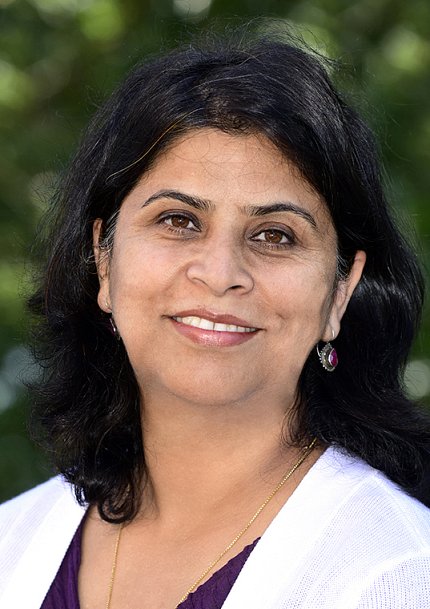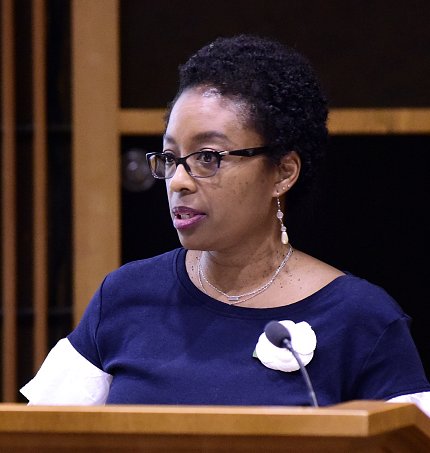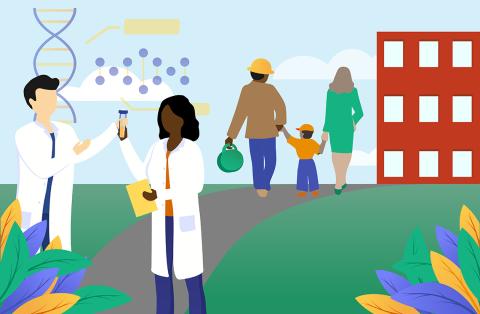NIEHS Science Education Office Focuses on Diversity, Equity

Photo: Steve McCaw
The National Institute of Environmental Health Sciences is unusual among NIH institutes and centers in having an Office of Science Education and Diversity (OSED). According to OSED director Dr. Ericka Reid, her office supports a diverse environmental health workforce as called for in the 2018-2023 NIEHS Strategic Plan. Activities include outreach, information sharing and providing access to opportunities. The office helps the institute achieve its strategic goal by connecting with elementary students through postgraduate trainees.
To increase participation from groups underrepresented in the scientific workforce, NIEHS hosts local students each year in the NIEHS Scholars Connect Program (NSCP). College juniors and seniors, selected through a competitive process, conduct paid research at the institute and get an inside look at scientific careers. Recruiting focuses on historically black colleges and universities (HBCUs), as well as underrepresented groups at nearby universities, Reid explained.
Normally, students—who work with a mentor and lead researcher—arrive in the summer for full-time laboratory research. During the academic year, they work part-time, culminating in presentations to the entire institute. Lab work is augmented by a series of seminars on leadership, emerging research areas, peer mentoring, articulating accomplishments and applying to graduate and medical schools.
As with so much that happened in 2020, last year’s program was different.

Photo: Steve McCaw
NSCP coordinator and OSED Undergraduate Research Training Program manager Dr. Suchandra Bhattacharjee said that 2020’s program cycle began in fall, after a summer spent reworking the plan. “Launching NSCP in a virtual format meant treading in uncharted territory,” she said. “But we’ve had incredible support from leadership and mentors, and the scholars were enthusiastic, saying they would do it all over again.
The fall connection wrapped up with a 3-minute talk competition in late November. The scholars competed by conveying in plain language their work and its impact on them, through short elevator-pitch style talks. This popular format fosters skill at effectively explaining research to a broad audience. Judges often include nonscientists at the institute.
HBCU-Connect is a new OSED program targeting local HBCUs to build awareness of NIEHS and environmental health careers among freshmen and sophomores. “We can expand the pipeline by feeding into it sooner,” Reid explained. Students will be encouraged to learn more about NIEHS through information sessions, shadow researchers during spring break, and apply to the Summer Internship Program. “That way, they would already know about NSCP and be prepping for it,” she continued.

Photo: NIEHS
Nearby North Carolina Central University (NCCU) is slated to be the first connection, launching in spring 2021. “We would have launched this fall, with tours by freshmen and sophomore students and faculty, and meetings with current scholars and postbacs,” Reid said, referring to postbaccalaureate fellows.
To recognize the new relationship, NIEHS and National Toxicology Program director Dr. Rick Woychik spoke virtually with NCCU students in early November. He described environmental health concepts such as the microbiome, developmental periods at which a body is particularly susceptible to exposures, epigenetics and exposures to mixtures compared with single chemicals. By sharing research findings sponsored by NIEHS, he provided concrete examples of those concepts at work.
Reid has long conducted outreach by attending the Society for Advancement of Chicanos/Hispanics and Native Americans in Science, the Annual Biomedical Research Conference for Minority Students, Society of Toxicology and other conferences. The first two groups register several thousand participants for their annual meetings, more than 900 of whom are students, according to Reid. She promotes environmental health, internships, fellowships and other opportunities at the institute.
Other OSED initiatives include:
- School partnerships, with visits to classrooms by NIEHS Speakers Bureau volunteers, teacher workshops and multiyear partnerships with specific schools, especially those with underserved populations. Dr. Huei-Chen Lee coordinates K-12 science education.
- The Diversity Speaker Series hosts talks by scientists and other professionals from underrepresented groups emphasized by the NIH Office of Equity, Diversity and Inclusion—women, sex and gender minorities, people with disabilities, African Americans, Hispanics, Native Americans and Asian and Pacific Islanders.
- Internal efforts include NIEHS intranet pages on equity, diversity and inclusion, as well as a blog on related topics.
The NIH Scientific Workforce Diversity Strategic Plan recognizes that diversity increases creativity and performance, supports innovation, is essential for reducing health disparities and achieves more equitable use of public funds.
